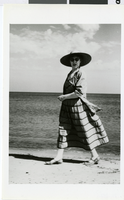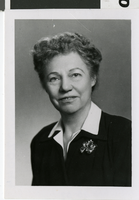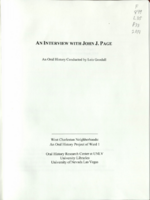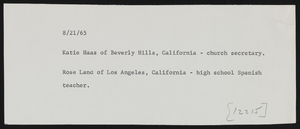Search the Special Collections and Archives Portal
Search Results
Ruby Thomas oral history interview
Identifier
Abstract
Oral history interview with Ruby Thomas conducted by Craig Hawkins on October 05, 1973 for the Ralph Roske Oral History Project on Early Las Vegas. In this interview, Thomas discusses her career as a teacher in Las Vegas, Nevada and being member of the Retired Teachers Association. She then describes social and environmental changes, and the construction of Hoover Dam (Boulder Dam). Lastly, Thomas recalls the population growth and casino development in Las Vegas.
Archival Collection

Transcript of interview with Judy Laliberte by LaVaun Hendrix, February 27, 1979
Date
Archival Collection
Description
On February 27, 1979, collector Judy Laliberte interviewed local school teacher LaVaun Hendrix in her home in Las Vegas, Nevada. The two discuss how Hendrix originally came to Nevada, her occupational history, and differences between the school system in Las Vegas and other states that she’s lived in. Hendrix explains how a changing school system has affected her job as a teacher and her students. She goes on to talk about the above-ground atomic tests, Helldorado, changes to the desert, and Nevada during World War II. The interview concludes with Hendrix describing her travels through Nevada.
Text
Harvey Munford oral history interview
Identifier
Abstract
Oral history interview with Harvey Munford conducted by Claytee D. White on August 21, 2015 for the African Americans in Las Vegas: a Collaborative Oral History Project. Munford begins by discussing his career as a Nevada State Assemblyman and the Nevada legislative process. He then describes his early history, detailing his college education and athletic career as a basketball player for the University of Akron and later at Montana State University Billings. Munford also describes the discrimination he faced as an African American throughout his life particularly during the 1960s and 1970s, arriving in Las Vegas, Nevada in 1966, and his thirty-eight year career as a teacher in the Clark County School District.
Archival Collection

Photograph of Ann E. Brewington, 1920s-1930s
Date
Archival Collection
Description
Image

Photograph of Ann E. Brewington, 1954
Date
Archival Collection
Description
Image
Clarence Gilyard oral history interview
Identifier
Abstract
Oral history interview with Clarence Gilyard conducted by Barbara Paige on December 02, 2014 for the African Americans in Las Vegas: a Collaborative Oral History Project. Gilyard begins the interview by discussing his upbringing on United States Air Force bases, his father's career as an Airman, and the advantages he had attending Air Force schools as a child as opposed to attending public schools, where he may have faced discrimination as an African American. He describes his higher education, playing college football, and later pursuing a career in acting after becoming involved in local theatre while attending college at California State University, Long Beach. Gilyard continues, detailing how he gained more acting work and eventually acted alongside actors like Jim Carrey, Andy Griffith, and Chuck Norris, as well as starred in film and television series such as Top Gun, Die Hard, Matlock, and Walker, Texas Ranger. He concludes by discussing his career as an acting teacher and continuing his own education.
Archival Collection


Transcript of interview with John Page by Lois Goodall, April 16, 2014
Date
Archival Collection
Description
John J. Page attended 13 schools before graduating from high school in the Ozark Hill Country of Oklahoma. Although he engaged in no combat, he was drafted into military after completing two years of college at the University of Oklahoma in Norman, Oklahoma. After his discharge from the U.S. Air Force, he helped his wife, Reitha, finish the credits she needed to complete her degree, and he then worked to complete his in Norman. Following his graduation, the couple relocated to Las Vegas in February 1959, when Reitha found a job at Washington Elementary School. In Las Vegas John completed his practice teaching under master teacher Lamar Terry at Twin Lakes Elementary School and under supervision of Dr. Holbert Hendrix at the University of Nevada, Las Vegas. John held his first teaching assignment, fifth grade at West Charleston Elementary School (later called Howard Wasden Elementary School), for 27 years before transferring with his principal to Helen Marie Smith Elementary School. For a time John and Reitha rented a small house at the comer of Bonanza Road and First Street that was owned by entertainer Horace Heidt. They bought their first house, a Pardee Park Home one block north of Tom Williams Elementary School in North Las Vegas, because Reitha taught there, and she and the children could walk to school together. In 1973 they bought their current house on El Cortez Avenue in the Westleigh tract. Page not only worked in Ward 1 for 27 years of his 36-year teaching career (1959-1995); he and his family also lived in Ward 1 for more than forty years. As a teacher in the school that served the wealthiest Las Vegas families, Page witnessed the many ways that generous donations of time, money, and talent matter to schools, students, and teachers. As an early resident of Westleigh tract, Page saw dramatic changes to the area's built environment. And as a longtime educator, Page observed several cycles of experimental instmctional techniques and philosophies.
Text

Transcript of interview with Charles T. "Blackie" Hunt by Cork Proctor, July 3, 2003
Date
Archival Collection
Description
Charles T. "Blackie" Hunt, born in Pottstown, Pennsylvania in 1930, started accordion lessons at age five. He recounts learning from experienced musicians, then teaching others at age twelve because his teacher was drafted. He attended West Chester State Teachers College where, among other accomplishments, he put together a group with Nick Carlino as tenor sax player. Blackie shares detailed memories of the many musicians with whom he worked and toured. They played in venues that included Harrisburg, Toronto, and Montreal, and eventually were offered a booking at the Sahara Hotel in Las Vegas. The group that Blackie worked with in Las Vegas, Tahoe, and Reno came up with the name "The Characters" (backward 'e'), and the show featured comedy and music. It was during this time that he met Lorraine (stage name Lauri Perry), who had her own group. They were married after a couple of years and Lauri joined The Characters. Blackie and Lorraine Hunt opened Blackie's Bar on Tropicana and Eastern Avenues in the seventies. He talks about the jazz sessions that took place and the musicians who sat in on them, and how he and Lorraine eventually decided to bow out of show business themselves. The Hunts went on to open the Bootlegger, a restaurant/piano bar on Las Vegas Boulevard. They started a little comedy/music session called "Off the Cuff', in which local or touring musicians, comedians, and singers often participate. Blackie and Lorraine have been part of the vibrant history of Las Vegas and the state of Nevada for many years, and continue to make their home here.
Text

